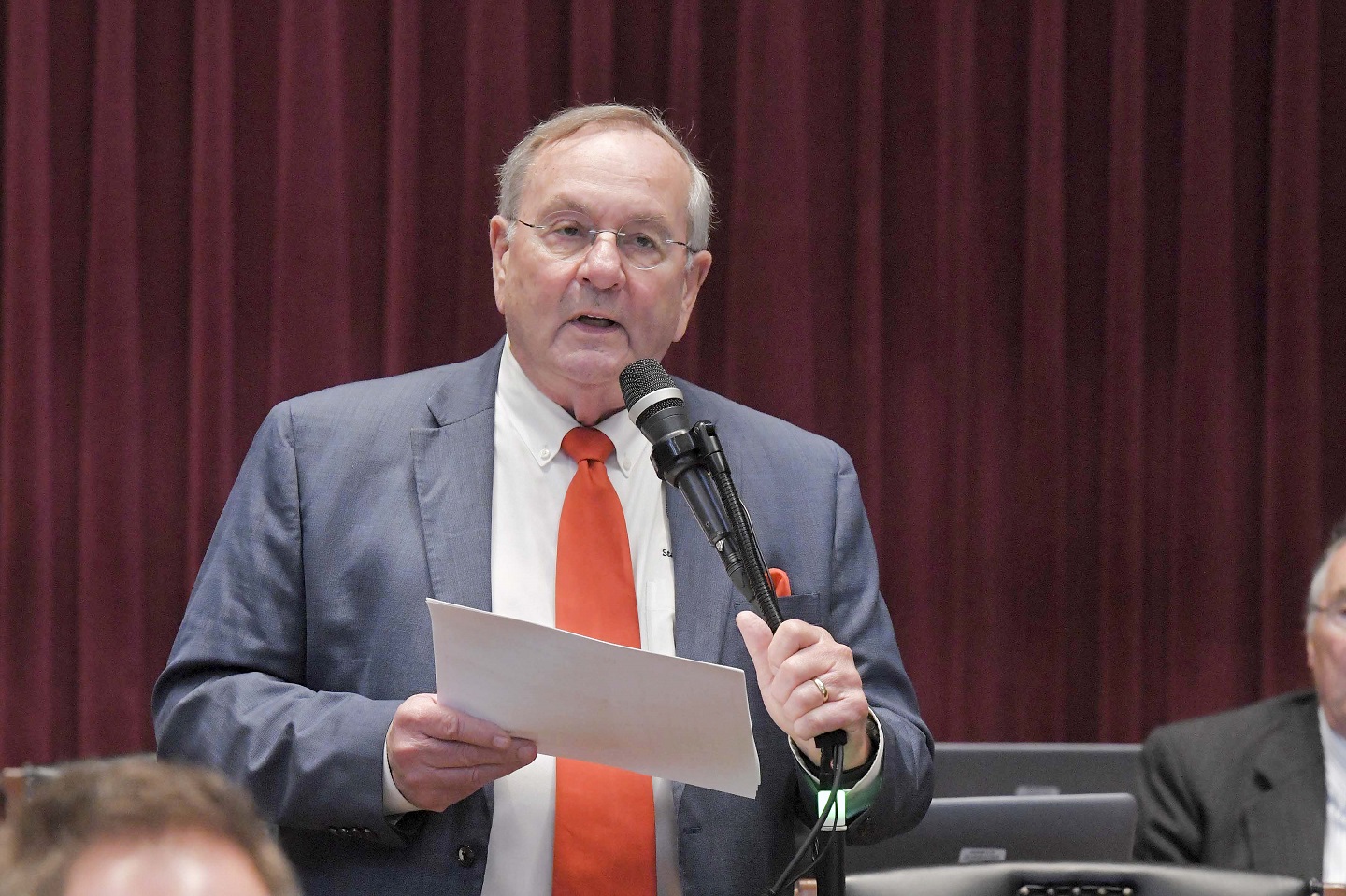As the Missouri House began its 2026 regular session, Representatives Lane Roberts (R-Joplin) and Jim Schulte (R-New Bloomfield) were presented with pins recognizing their service in Vietnam. They received their pins from fellow veteran and Chairman of the House Veterans and Armed Forces Committee, Representative Dave Griffith (R-Jefferson City), who was introduced by Representative Don Mayhew (R-Crocker).
Tag: veterans
VIDEO: Missouri House Veterans Recognition Day 03-27-2025
The Missouri House’s annual Veterans Recognition Day was this morning in the State Capitol Rotunda. It was led by Veterans Committee Chairman Dave Griffith (R-Jefferson City) as well as House Speaker Jon Patterson (R-Lee’s Summit).
Four Year Effort to Stem Veteran Suicide Reaches Governor’s Desk
An effort to decrease the incidence of suicide in Missouri especially among veterans, one that has long been a top priority for one House member, is at last on the governor’s desk.
The legislature approved two bills containing Jefferson City Representative Dave Griffith’s (R) plan, one he has proposed for four years. If signed by Governor Mike Parson (R), it require the Missouri Veterans Commission to come up with recommendations on how veteran suicide can be prevented; and to report annually on new recommendations and on the implementation and effectiveness of state efforts.
The standalone version of his bill never received a “no” vote at any step of this year’s legislative process.
In Missouri suicide occurs among the veteran population nearly twice as often as in the rest of the population. Griffith said this effort is all about reducing that rate, ideally to nothing.

An already personal quest becomes more personal
Griffith, a U.S. Army veteran, has made veterans’ issues his top priority throughout his time in the House. In dealing with this issue, he has talked to people who have survived suicide and to families of those who have died by suicide. Then last year, one of his close friends died by suicide.
Ever since, he has kept on his Capitol office desk the last letter that friend sent him.
Griffith told this House Communications staffer, “When it happens to [someone you know], you look through a different lens than you ever have before. Somebody you knew, somebody you sat as close as we’re sitting today and talking and had a conversation with, you shared a beer over it and you’re talking about your time in the service or what you did, and then two weeks later they take their own life, and you’re sitting there thinking, ‘I didn’t have a clue.’”
The functional effect of the legislation
A chief function of Griffith’s legislation is to make sure that the data that is gathered about veterans suicide, of which there is a great deal, is compiled and made available to those concerned with the issue.
“We have hearings and we have meetings and we collect data and we collect information, but, where does it go? What do we do with it?” Griffith said. “That next step needs to be taken where we’re getting information out to the American Legion, the VFW, the Marine Corps League, the DAV, we’re getting information out to those organizations where they can start helping those veterans.”
He wants to ensure that that information is being utilized as effectively as possible to improve efforts including outreach, treatment, and even identifying those at risk of suicidal ideation.
“There’s some things you can look at. Your MOS, your military operating service, what you did; how many times you were deployed; where were you deployed; how many times were you in combat; how many times did you receive fire, you felt your life was in danger; where are you from; how old are you? I think there’s some data that … these are things that we need to look for,” Griffith said. “We also need to take into consideration that somebody [who takes their own life] may not have ever been in combat. They may have just been in-theater … just in the surroundings of it, just being in a place where you hear bombs going off, when your building is shook by incoming mortars.”
Griffith is pleased to note that the Veterans Commission has already started implementing some of what the bill requires.
The goal: to help all who need it
Even though the focus of his bill is on veteran suicide, his concern is for suicide and related mental health issues throughout the population.
“When I began this journey four years ago … my hope was, is, that this would be a springboard to conversations outside the veteran community, outside the military community, to one that is really in the civilian population as well.”
He has talked numerous times in the past four years about tragedies that play out too often. Prominent for him is the story of one child from near his district who died by suicide in recent years.
Perspective born of experience
Asked whether he wishes a similar focus on mental health had been in place when he was in the military, Griffith thought back to his time in the 8th Special Forces Group as a Green Beret. Many of the missions he participated in during his service in Vietnam were classified, and that limited how much he could talk to anyone about what he experienced.
Especially with the Vietnam War, he said, conflicts awaited soldiers when they returned home.
Griffith said he has dealt with his pain by compartmentalizing.
The message this legislation sends
Aside from the functional effects of his legislation, Griffith said the fact that he proposed it and the fact that it has consistently received unanimous support send a message to veterans. He wants them to know that they are valued.
For those who care about veterans and others dealing with mental health, Griffith has heard time and time again from experts that societal stigmas are the a large part of what must be overcome. Those struggling are worried about what will happen to them if they seek help.
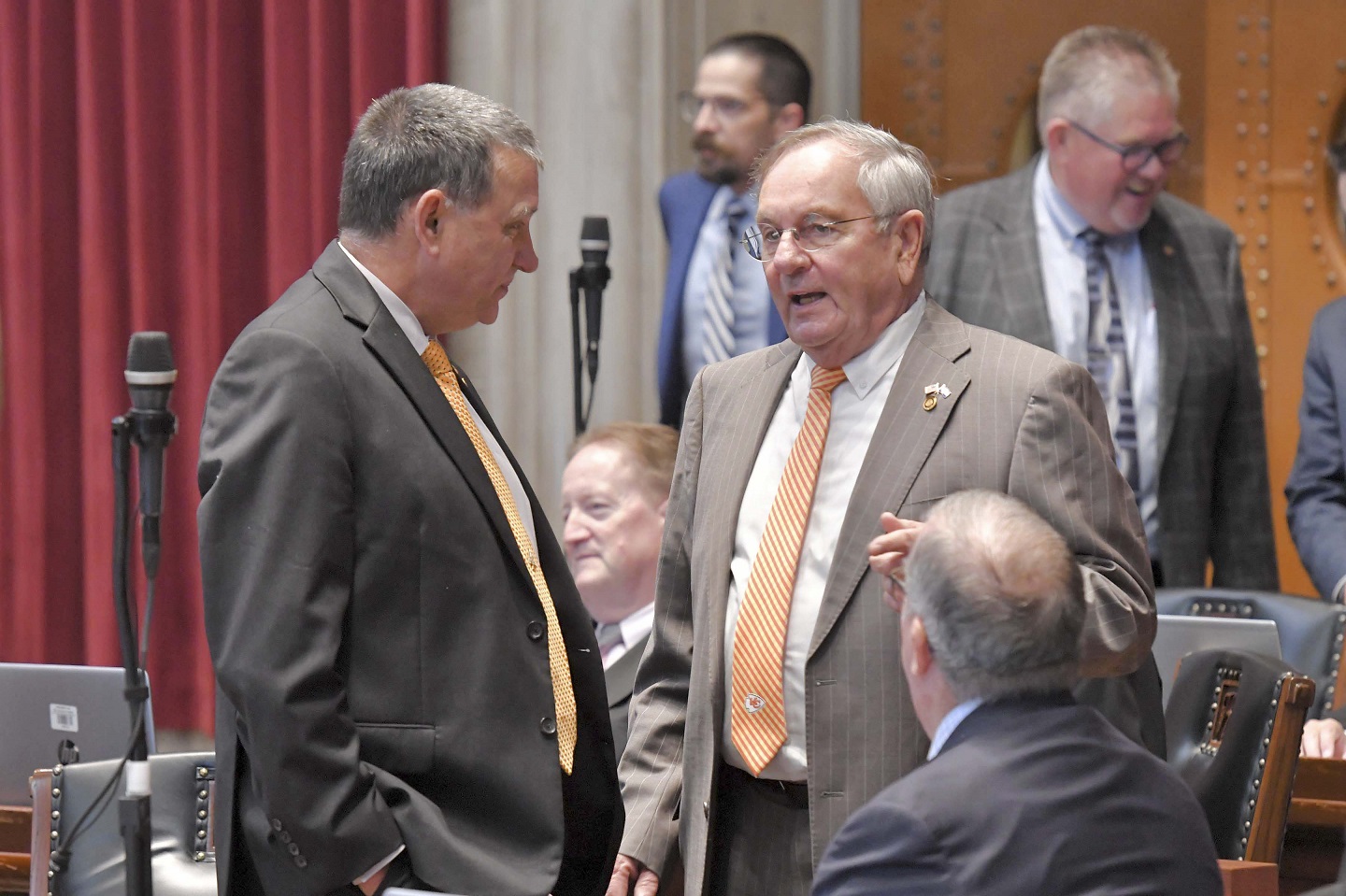
Most Missourians likely know someone who is struggling with mental health issues, even if they don’t know it. Griffith hopes that though efforts like this legislation, more people will look into what they can do for themselves or for someone else.
Griffith’s proposal reached the governor’s desk as a standalone bill in House Bill 1495, and as part of Senate Bill 912. The governor can choose to sign either or both bills into law, veto them, or allow them to become law without taking action. Griffith anticipates he will sign his proposal into law.
Missouri House legislative effort to stem veteran suicide continues
Veteran suicide is an issue the Missouri House of Representatives has sought to address for some time, and in the past year it touched the life of the man who has led that effort. He entered the 2024 legislative session with renewed passion to see his legislation become law.
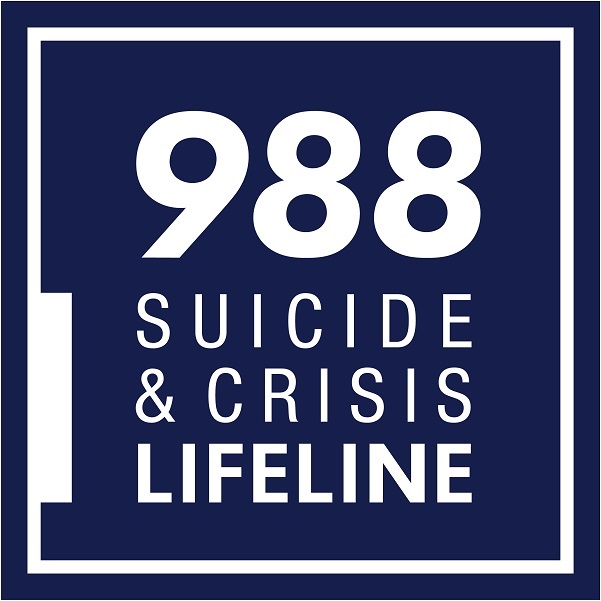
The House last year voted 156-0 in support of requiring the Missouri Veterans Commission to come up with recommendations on how veteran suicide can be prevented; and to report annually on new recommendations, and the implementation and effectiveness of state efforts. That bill was approved 8-0 by a Senate committee but did not reach passage in that chamber. This year the proposal is back, and is one of the first House measures to get a committee hearing.
Representative Dave Griffith (R-Jefferson City) is the sponsor of House Bill 1495. He is a U.S. Army Veteran and the chairman of the House Veterans Committee, which held that hearing.
“It’s a topic that is near and dear to my heart. It’s one that I feel like … we’re not making a great deal of success and progress in preventing suicide,” Griffith told his colleagues.
Griffith said Missouri agencies are actively working to stem veteran suicide.
Kerchoff told the committee the data on suicide rates has not been encouraging.
“Suicide rates in Missouri continue to be high … active duty suicides are the highest since the great depression. In 2019 there were 188 veteran suicides, 2020 there were 174 in Missouri, and Missouri is significantly higher than the national average for veterans,” Kerchoff said. “Our rate [of veteran suicides] is 45.2 per 100,000, but to give you the national average is just 33.9, so Missouri’s is significantly higher than the national average.”
Asked why the rate in Missouri exceeds the national average, Kerchoff said the answer isn’t known, and that’s one more reason why he wants to see HB 1495 pass.
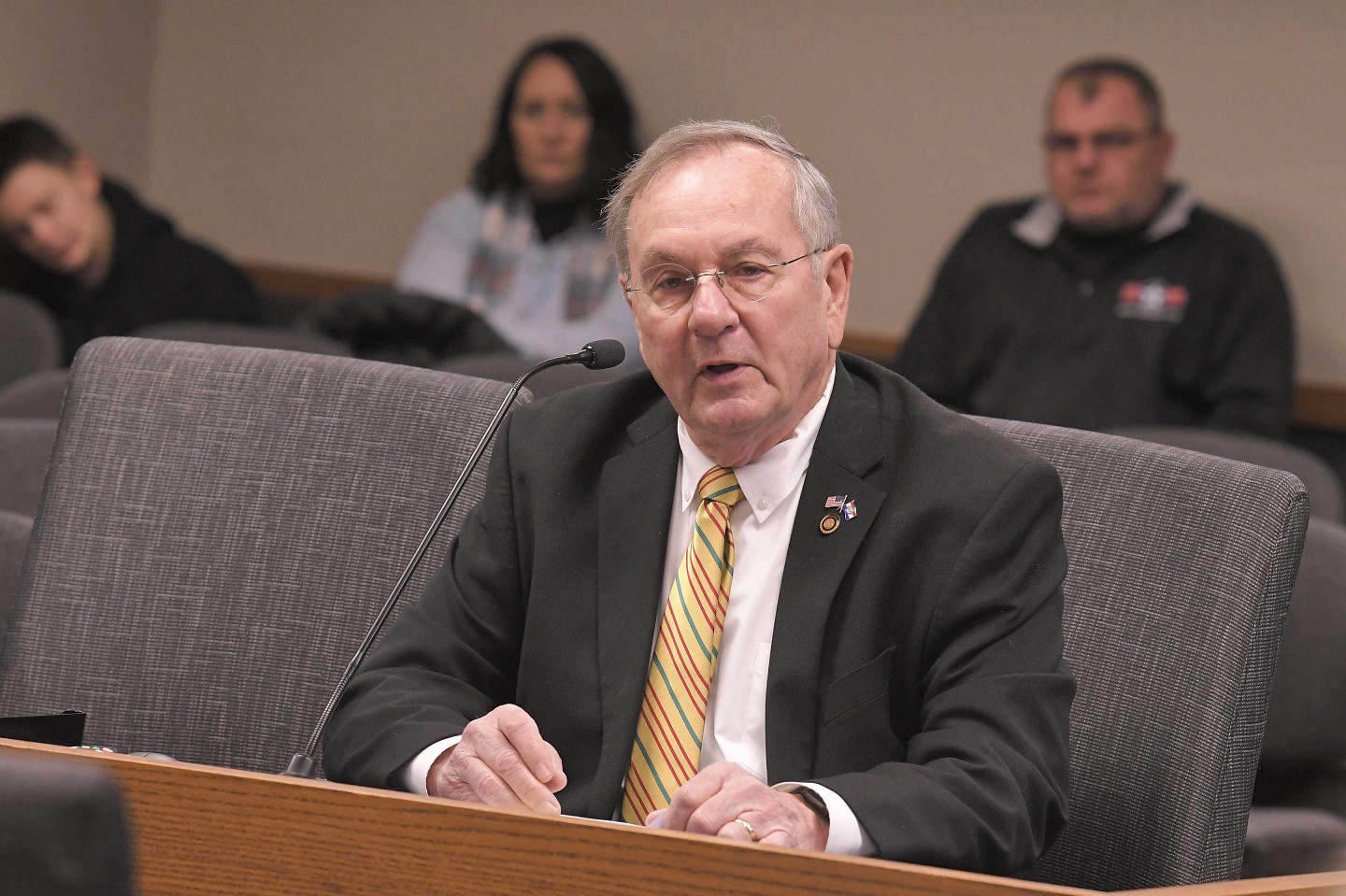
Kerchoff said the issues that impact the mental health of veterans require specialized understanding and approaches.
Representative Jim Schulte (R-New Bloomfield), in speaking to the stigmas facing veterans seeking mental health help, talked about a friend who did get treatment. He was then, initially, denied reentry to the National Guard because he’d sought treatment.
“We’ve got to overcome this stigma. We tell everybody we’ve got these help lines, we have these programs, but they’re leery of every doing them because then we stigmatize them and label them,” said Schulte. “In the name of, we say we want to help, we’re putting a badge on them that’s not a positive thing.”
A number of state agencies, including the Missouri House, have worked to drive up awareness of the 988 Suicide and Crisis Lifeline, and Griffith said that remains one of the best resources available for those seeking help.
“The number of calls that we’re getting in the State of Missouri has far exceeded what they ever thought it would. In the first month they had over 20,000 calls,” Griffith told the committee.
Griffith and the staff of House Communications spent time this past summer creating a series of public service announcements for radio, television, and social media that target suicide and specifically veteran suicide. Those will soon be available for circulation.
The Veterans Committee voted unanimously to advance HB 1495.
Families no longer have to pay for highway memorials for fallen first responders and service people
Memorials for fallen veterans, police officers, and firefighters, and for those missing in action, will no longer be paid for by the families of those individuals, under legislation that became law this year.

It’s called the “FA Paul Akers, Junior, and LCPL Jared Schmitz Memorial Sign Funding Act,” and it stemmed from the efforts to memorialize those two men, both of whom died while serving their country. When legislators learned that their families were billed for the signs honoring them, they proposed the language that would have those costs paid for by the Department of Transportation.
“Most people in Missouri didn’t like the idea, just like I didn’t … that once we honor a fallen hero, we didn’t realize the paper trail behind the scenes was to send these invoices to their family members,” said Representative Tricia Byrnes (R-Wentzville).

Representative Don Mayhew (R-Crocker) said what was happening was “a shock to, in fact, everyone who’s ever gotten a memorial sign done. A lot of times what they have to do is they go around and they get donations from the VFW and other places in order to pay for the sign because, many of them, they don’t have $3,000 laying around for a memorial sign for the highway.”
Lance Corporal Jared Schmitz, of St. Charles, was among 13 U.S. Service Members and more than 100 others killed in a suicide bombing at a Kabul airport during the American withdrawal from Afghanistan in 2021. His family wanted to honor him with signs to designate an overpass on I-70 in Wentzville as a memorial bridge bearing his name.
His father, Mark Schmitz, said the family got a bill for those signs.
Schmitz, who lives in Byrnes’ district, said he supported her legislation not so much due to his family’s experience (donations covered their $3,200 cost in a matter of hours after an online fundraising effort was launched).

Schmitz said the passage of this legislation is, for him, in honor of his son.
Mayhew’s experience with the issue began with an effort to honor Fireman Apprentice Paul Akers, Junior, who was killed in the January, 1969 explosion and fire on the aircraft carrier USS Enterprise, CVAN-65, off the coast of Oahu, Hawaii. Akers was also from Crocker.
Mayhew is just glad the proposal finally became law.
“I also want to apologize to those families who have lost loved ones in service to our nation and our state who had to pay for these signs over the years. I hope that they can take solace in the fact that no other family will have to suffer from the cost of these signs ever again,” said Mayhew. “These Gold Star families have already given all in service to the country. The least we could do is pay for a memorial sign.”

Byrnes said the legislation was the subject of very little opposition, and for good reason.
The family of LCPL Schmitz isn’t finished honoring him. His father said they are now working to raise money for a series of 100-acre recreational retreat camps, one in each state, for veterans and their families to use for free. Each will have 13 available houses, one for each of the U.S. service people killed in the attack in which his son died.
Advocates who deal with veteran suicide and mental health issues say one of the best outlets for veterans, especially those who have experienced combat, is other veterans.
Byrnes and Mayhew sponsored identical bills. When Byrnes’ version, House Bill 882, came to a House vote, it passed 153-0. The language later became law as part of Senate Bills 139 and 127.
House votes to increase state efforts against veteran suicide
The House has voted to improve the state’s efforts to prevent suicide among its veteran population.

Representatives voted 156-0 for House Bill 132, which directs the Missouri Veterans Commission to work with the Department of Mental Health to come up with recommendations on how Missouri can prevent veteran suicide. It would require the Commission to report annually, beginning June 30, 2024, on new recommendations and on the implementation and effectiveness of the state’s efforts.
The bill is sponsored by Jefferson City Republican Dave Griffith, a U.S. Army Veteran who served with the 8th Special Forces Group as a Green Beret. He has spent much of his career in the House dealing with veterans’ issues, and with ways to stem suicide not only among current and former service members but in the population in general.
Griffith speaks often of the social media campaign #22, and his personal goal of decreasing or eliminating what that number represents.

Though he and others in the legislature and state government have been talking about these issues for years and developing related programs, Griffith said Missouri has a long way to go. Representative Ashley Bland Manlove (D-Kansas City), who has served in the Missouri National Guard, agreed.
“I think the biggest population that we should be talking about is the one percent of American population that raises their right hand for this country,” continued Bland Manlove. “The best way that we can thank our veterans for their dedication and work to this country is by taking care of them.”
Rogersville Republican Darin Chappell (R) has a great deal of experience with the issues faced by military members and their families, as he is a veteran of the Navy and the Army Reserves and has many service members in his family.
Before casting their votes for the measure, legislators reflected about their own personal experiences. St. Clair Republican Brad Banderman solemnly told his colleagues, “About two years ago my little sister laid down on the grave of my older brother that shot himself in 1990 and killed herself. Anything that we can do as a legislature, as a body, as individuals, to help prevent the suicide of our veterans, I’m in full support of.”

Missouri as of 2020 had the 14th highest suicide rate in the U.S., with about 1,125 people having died by suicide in that year. The rate among veterans is approximately 1.5 higher than in the rest of the population, and experts are telling legislators they fear that suicide rates are going to increase.
“I think we need to do better and I think this is a good start,” said Representative Robert Sauls (D-Independence).
The same bill passed out of the House last year but did not come to a final vote in the Senate.
Anyone in need of help for themselves or someone else for a mental health, substance abuse, or suicide crisis is encouraged to call 988.
Bills would have MODOT, not families, cover cost for highway memorial signs
The families of fallen veterans, police officers, and firefighters, and of those missing in action, would no longer have to foot the bill for highway or bridge memorial signs honoring those loved ones under a bill approved by a House committee.
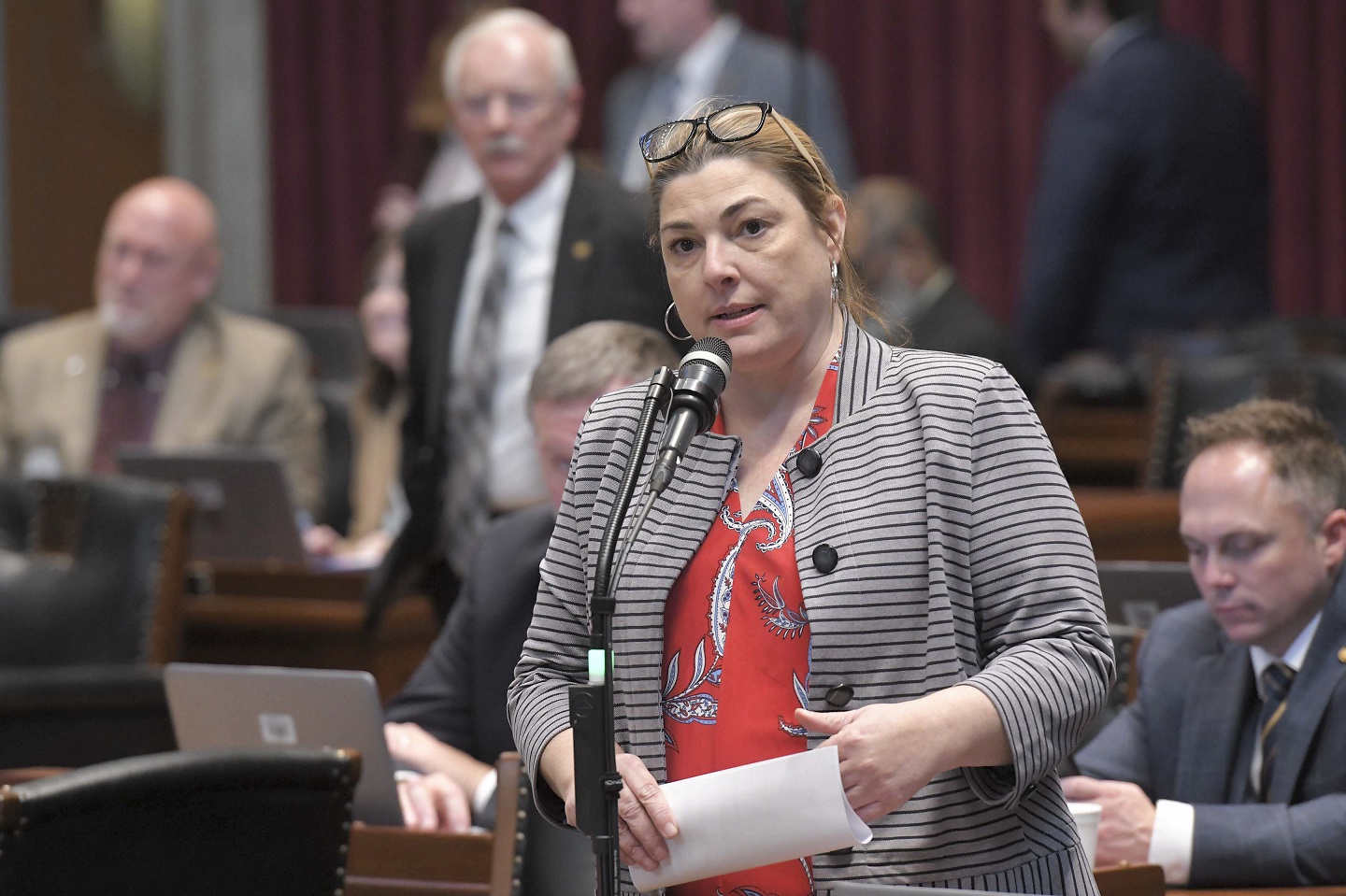
Legislation sponsored by Representatives Tricia Byrnes (R-Wentzville) and Don Mayhew (R-Crocker) would require the Department of Transportation to cover those costs.
“Keep in mind, folks, these are the folks who gave all to represent our country … if we’re going to have honorary signs, the very least that we can do is pay for it,” said Mayhew when presenting the legislation to the House Committee on Transportation Accountability, which he chairs.
Byrnes joined Mayhew in proposing this change in response to the effort to honor Marine Lance Corporal Jared Schmitz, a Wentzville native, who was one of 13 U.S. military members who died in a 2021 bombing at an airport in Kabul, in Afghanistan. She learned that when Corporal Schmitz’s family wanted to have a section of highway named for him they received an invoice from the Department of Transportation for more than $3,000.
Schmitz said he talked to the families of the other 12 personnel who died at the same time as his son. None of them had to pay the cost of having a memorial sign placed in honor of their loved on, on a highway in their respective states.
The Department of Transportation did not oppose the legislation but offered information on how the system currently operates. Chief Safety and Operations Manager Becky Allmeroth said the Department has to consider other signage.

Allmeroth told legislators, “We have 830 memorial designations across the state highway system. The number is expected, with this bill, to increase exponentially if the current participation fee is removed.”
Most committee members voiced support for making the change in policy.
“Personally I don’t care about the costs. I just think we need to do this. I don’t think the family should pay,” said Republican Bob Bromley (Carl Junction). “If we’re making the Slim Pickens Highway or Mark Twain Highway at Hannibal I understand having a fee. If we’re doing it for fallen soldiers I think [having a fee is] ridiculous.”
The committee voted unanimously in favor of the bills, House Bill 882 (Byrnes) and 518 (Mayhew), advancing them to another committee for consideration.
House efforts target suicide especially among veterans
One House member continues his push to reduce suicide in Missouri, particularly among the state’s veterans.

Representative Dave Griffith (R-Jefferson City) has made veterans’ issues a priority throughout his five years in the House, and now chairs the chamber’s Veterans Committee. Over the summer he also chaired an interim committee on Veterans’ Mental Health and Suicide.
Griffith said one of the most important things that committee learned is that in Missouri the 988 Suicide and Crisis Hotline is not fully funded.
Griffith is again this year sponsoring legislation to give guidance to the Missouri Veterans Commission about how to use the data it collects on veteran suicides, as well as to require it to report annually to the legislature on that data and what it’s doing to reduce the number of those incidents.
“Where we rank in this in the entire country is not good,” Griffith told the House Committee on Health and Mental Health Policy, saying Missouri is around fourth or fifth among the states with the most veteran suicides.
He added that even though his proposal, which this year is House Bill 132, didn’t pass in 2022, the Commission is already doing much of what it would require.
“Their heart’s in the right place and I can tell you that they get it and they’re dealing with it.”
Griffith said his aim is not just to increase awareness about mental health and suicide in the military and veteran communities but among the population as a whole.
This week Griffith presented HB 132 to Veterans Committee and presented the report from his interim panel to the Committee on Health and Mental Health Policy, showing that the issue is again his top priority as the 2023 session gets underway. He spent much of both presentations speaking about the 988 hotline because of the importance of listening to those considering suicide, whether it be when they call the hotline or in other settings.
He said one thing discussed at a recent symposium on suicide in the military community that resonated with him is a question that was put to commanders: “Do you really know your personnel?” He said the same could be asked of managers in the private sector.
“In order for us to be able to make a difference they’ve got to be able to know and be able to identify and recognize when there’s something going on in [their subordinates’] lives,” said Griffith. “What my hope was, is we can take that same model and we can bring that into the private sector. We’ve got companies like Scholastic and we’ve got Hitachi, we’ve got Westinghouse, large companies across the State of Missouri and each one of them have got supervisors. If we can train those supervisors and we can get people that have got the aptitude and really the forthrightness to be able to do something like that, it’s something that I hope we can learn from our military background and military friends.”
Griffith’s proposal passed out of the House unanimously last year but didn’t reach Governor Parson. The Veterans Committee will likely vote on it soon.
Committee advances honor for atomic veterans
U.S. veterans who were part of the military’s nuclear testing programs or the follow-up to the use of nuclear weapons would be honored by a bill moving through the House.

Representative Bob Bromley (R-Carl Junction) says as many as 400,000 American military personnel were exposed in one way or another to nuclear radiation, but for decades they couldn’t talk about it.
“This was a very classified operation, and the people involved … had to swear an oath of secrecy. They would’ve been charged with treason if they would’ve even mentioned this because it was so secretive,” Bromley told the House Veterans Committee.
Consequently many of these veterans were not compensated for treatments for diseases they developed likely as a result of those nuclear operations.
“A lot of them had developed illnesses. I think 23 different types of cancers have been associated with this,” said Bromley.
He said it’s perhaps difficult to believe now what these military members were expected to do.
House Bill 1652 would designate part of Highway 171 the “Atomic Veterans Memorial Highway.” Bromley said many other states have so honored this group of veterans and its important that Missouri follow suit, especially as so many of them are elderly or have already passed on.
The Veterans committee voted 12-0 to advance the measure. It must go before one more committee and then could be considered by the full House.
